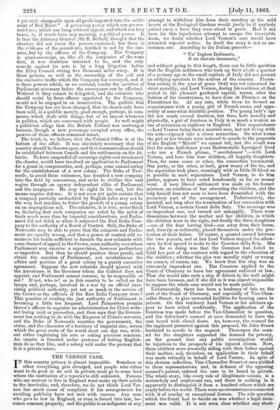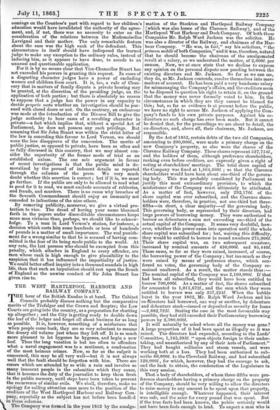THE VERNON CASE.
IN this country privacy is almost impossible. Somehow or other everything gets divulged, and people who either want to do good or do evil in private must go to some land - where the institution of a reporter is still unknown. Persons who are content to live in England must make up their minds to the inevitable, and, therefore, we do not think Lord Ver- non has much cause of complaint if his arrangements for avoiding publicity have not met with success. Any man who goes to law in England, or even is forced into law, be- comes common property, and the public is as indignant at any attempt to withdraw him from their scrutiny as the wild beasts at the Zoological Gardens would justly be if anybody pulled away a bone they were about to gnaw. Had it not been for this injudicious attempt to escape the inevitable doom, we doubt whether Lord Vernon's ease would have attracted especial notice. In itself the story is not an un- common one. According to the Italian proverb- " Un' Inglese Italianato, E un diavolo incarnato;" and without going to this length, there can be little question, that the English noblemen who took up their abode a quarter of a century ago in the small capitals of Italy did not present. an edifying spectacle to the natives of the country. Floren- tine society in the year of grace 1842 was not renowned for strict morality, and Lord Vernon, during his residence at that Period in the pleasant gardened capital, seems, after the- fashion of his countrymen, to have done at Florenre as the Florentines do. At any rate, while there he formed an acquaintance with a young girl of French name, and appa- rently of somewhat doubtful position. The young lady's age did not much exceed fourteen, but then, both morally and' physically, a girl of fourteen in Italy is as much a woman as- one of seventeen or eighteen in England. This acquaintance- - Lord Vernon being then a married man, but not living with his wife—ripened into a closer connection. On what terms. thegirl or her friends were induced to accede to the proposals. of the English " Milord " we cannot tell, but the result was that for some half-dozen years Mademoiselle Lavrignal lived — to use a French phrase, " nwritalement "—with Lord, Vernon, and bore him four children, all happily daughters. Then, for some cause or other, the connection terminated. One party, or the other, or both, grew weary of the tie, and the separation took place, seemingly with as little ill-blood as is possible in such separations. Lord Vernon, to do him justice, appears to have acted handsomely as far as money went. A very liberal settlement was made on his former mistress, on condition of her educating the children, and the- lady herself does not seem to have been dissatisfied with the pecuniary part of the arrangement. Unfortunately, she- married, not long after the termination of her connection with Lord Vernon, a certain Count della Seta. The marriage was- an imprudent one, and turned out unhappily. There were dissensions between the mother and her children, in which‘ the children were in the right, and finally the three daughters —one of the four having died—ran away from their home, and, directly or indirectly, placed themselves under the pro- tection of their father. Of course, a quarrel ensued between, the two parents, and at last Lord Vernon stopped the allow- ance he had agreed to make to the Countess della Seth. His- plea for so doing was that the Countess had failed to fulfil her part of the contract with regard to the education or the children ; whether the plea was morally right or wrong, we cannot, of course, say. We know that the step was an extremely imprudent one. The Countess applied to the- Court of Chancery to have her agreement enforced at law.. That she would take such a step if driven to the wall might have been foreseen, and if she did so it was almost impossible to suppose the whole case would not be made public. Unfortunately, there has been a tendency of late on the- part of the Court of Chancery, and especially of Vice-Chan- cellor Stuart, to give unwonted facilities for hearing cases in private. On this tendency Lord Vernon or his advisers ap- pear to have relied confidently. The application of the Countess was made before the Vice-Chancellor in question, and the defendant's counsel at once demanded to have the. case heard with closed doors. As, however, the counsel for the applicant protested against this proposal, Sir John Stuart hesitated to accede to the request. Thereupon the coun- sel for the daughters supported the demand for privacy, on the ground that any public investigation would be injurious to the prospects of his injured clients. Now, these children were avowedly siding with their father against their mother, and, therefore, an application in their behalf was made virtually in behalf of Lord Vernon. In spite of this obvious reflection, Vice-Chancellor Stuart at once yielded to these representations, and, in defiance of the opposing counsel's protest, ordered the ease to be heard in private. The whole story, like every tale of illegitimate unions, is a melancholy and unpleasant one, and there is nothing in it apparently to distinguish it from a hundred others which are yearly before the world. There were no circumstances connected with it of cruelty or exceptional licence. The sole question which the Court had to decide on was whether a legal docu- ment was valid. It is not even clear whether any short- comings on the Countess's part with regard to her children's education would have invalidated the authority of the agree- snout, and, if not, there was no necessity to enter on the consideration of the relations between the Mademoiselles Lavrignal and their mother. The only remarkable feature about the ease was the high rank of the defendant. This circumstance in itself should have indisposed the learned judge to make any exception to the ordinary rules, instead of inducing him, as it appears to have done, to accede to an unusual and questionable application.
For it is by no means clear that Vice-Chancellor Stuart has not exceeded his powers in granting this request. In cases of a disgusting character judges have a power of excluding women and children from court. It is, too, a rule of Chan- cery that in matters of family dispute a private hearing may be granted, at the discretion of the presiding judge, on the application of both parties ; but there is absolutely no reason to suppose that a judge has the power in any capacity to decide proprio motu whether an investigation should be pur- sued with closed doors or not. On the contrary, an endeavour was made at the introduction of the Divorce Bill to give the judge authority to hear cases of a revolting character in private—a fact which implies that, without a special Act of Parliament, he does not possess any such privilege. But assuming that Sir John Stuart was within the strict letter of the law in conceding this favour to Lord Vernon, we should none the leas disapprove of the concession. The merits of public justice, as opposed to private, have been so often and so fully discussed in this country, that we may almost con- sider the superiority of the former mode of trial as an established axiom. The one sole argument in favour of secret investigations is that the public mind is de- moralized by the perusal of indecent details as reported through the columns of the press. We very much doubt whether this assertion is correct ; but if it is, we must go further. If the public are only to be allowed to read what is good for it to read, we must exclude accounts of robberies, and frauds, and murders. There is no cause why breaches of the Seventh Commandment should enjoy an immunity not conceded to infractions of the nine others.
By removing publicity, moreover, we give a virtual pro- tection to vice. The dread of having your name blazoned forth in the papers under discreditable circumstances keeps more men virtuous than, perhaps, we should like to acknow- ledge. To a man in Lord Vernon's station, for instance, a decision which costs him some hundreds or tens of hundreds of pounds is a matter of small importance. The real punish- ment for a wrong similar to that he is accused of having com- mitted is the fear of its being made public to the world. At any rate, the last persons who should be exempted from this penalty, which attaches in England to every offender, are men whose rank is high enough to give plausibility to the suspicion that it has influenced the impartiality of justice. We could better afford inquiry into a thousand scandals in high life, than that such an imputation should rest upon the Bench ef England as the unwise conduct of Sir John Stuart has given rise to.




































 Previous page
Previous page